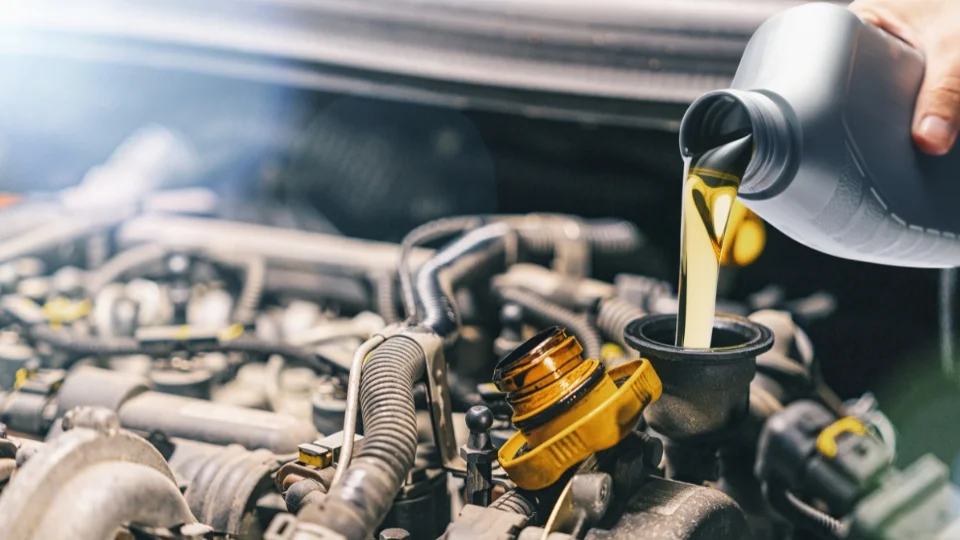Wondering how often you should change your oil? Search no more: this all-encompassing guide has everything you need. Whether you’re a car enthusiast or just a regular driver, understanding the importance of oil changes is crucial to the health and longevity of your vehicle. In this article, we’ll break down everything you need to know about oil change intervals.
From the recommended mileage intervals to the type of oil that best suits your engine, we’ll dive deep into the topic to provide you with all the necessary information. We’ll also debunk common myths and misconceptions surrounding oil changes, ensuring that you have accurate and reliable information at your fingertips.
Located in Richardson, TX, our team of experts understands the specific needs of your vehicle in this region’s climate and driving conditions. Whether you drive a sedan, a truck, or an SUV, our guide will help you determine the ideal frequency for changing your oil, ensuring that your engine runs smoothly and efficiently for years to come.
So, if you’re ready to learn more about the best practices for oil changes in Richardson, read on.

Consistent oil changes play a crucial role in preserving the well-being and efficiency of your vehicle. The oil in your engine lubricates the moving parts, reduces friction, and helps to dissipate heat. As time elapses, the oil may gradually accumulate dirt, debris, and other impurities, diminishing its purity and efficacy. This can decrease its effectiveness and potentially cause damage to your engine.
The frequency at which you should change your oil depends on several factors, including the type of oil you use, the age and condition of your vehicle, and your driving habits. While older vehicles typically require more frequent oil changes, newer models may have longer intervals between oil changes.
It’s important to consult your vehicle’s owner’s manual to determine the manufacturer’s recommended oil change interval. This will provide you with a guideline specific to your vehicle’s make and model. Additionally, keep in mind that certain driving conditions, such as extreme temperatures or stop-and-go traffic, may require more frequent oil changes.
When considering the recommended mileage intervals for oil changes, it’s crucial to strike a balance between maintaining optimal engine performance and avoiding unnecessary expenses. Changing your oil too frequently can be a waste of resources while neglecting regular oil changes can lead to costly repairs down the line.
To determine the ideal oil change interval for your vehicle, consider factors such as your typical driving conditions, the type of oil you use, and any manufacturer recommendations specific to your vehicle. By taking these factors into account, you can ensure that your engine remains well-lubricated and protected.
Selecting the right oil for your engine is crucial for optimal performance and longevity. There are various types of oils available, each with its own characteristics and benefits. Here are some factors to consider when choosing the right oil for your engine.
Viscosity denotes the oil’s ability to resist flow under varying temperature conditions. It is typically represented by a numerical value followed by the letter “W,” which stands for winter. For example, 5W-30 is a common viscosity rating. The initial digit (5W) denotes the oil’s viscosity in colder conditions, while the subsequent number (30) signifies its viscosity under hotter temperatures.
It’s important to choose an oil viscosity that matches your vehicle’s requirements. Using the wrong viscosity oil can lead to poor lubrication and potential engine damage. Your vehicle’s owner’s manual will specify the recommended viscosity range for your engine.
Derived from crude oil, conventional oil stands as the traditional preference for the majority of vehicles. It provides adequate lubrication and protection for the engine but may require more frequent oil changes.
Synthetic oil, on the other hand, is artificially engineered to provide superior lubrication and performance. It offers better resistance to heat, cold, and contaminants, allowing for longer oil change intervals. Synthetic oil is generally more expensive than conventional oil but can offer improved engine protection and fuel efficiency.
When choosing between conventional and synthetic oil, consider your vehicle’s age, driving conditions, and manufacturer recommendations. Synthetic oil is often recommended for newer vehicles or those subjected to extreme temperatures or heavy loads.
Some oils come with additives that provide additional benefits to the engine. These additives can help clean and protect the engine, reduce friction, and improve fuel economy. Typical additives encompass detergents, dispersants, anti-wear agents, and antioxidants.
When selecting an oil, consider whether you want these additives to be included. However, keep in mind that most quality oils already contain a balanced blend of additives. Adding additional additives may not provide significant benefits and could potentially disrupt the oil’s chemistry.
By understanding the viscosity, type, and additives in the oil, you can choose the best oil for your engine’s specific needs. Be sure to consult your vehicle’s owner’s manual to access the manufacturer’s suggested oil specifications.

Regular oil changes play a vital role in maintaining the health and longevity of your vehicle’s engine. Here are some key reasons why oil changes are essential for your engine’s well-being.
By placing emphasis on consistent oil changes, you can maintain the optimal health and performance of your engine. Failure to adhere to oil change schedules may lead to heightened levels of wear and tear, diminished performance, and the possibility of engine damage.
Determining the recommended mileage intervals for oil changes is a crucial aspect of maintaining your vehicle’s health and performance. While the exact interval may vary depending on factors such as vehicle age, driving conditions, and oil type, here are some general guidelines to consider.
For vehicles using conventional oil, the typical recommendation is to change the oil every 3,000 to 5,000 miles. This interval ensures that the oil remains clean and effective in protecting the engine. However, it’s important to note that newer vehicles and synthetic oils may allow for longer intervals between changes.
Synthetic oil generally lasts longer than conventional oil, with recommended oil change intervals ranging from 7,500 to 10,000 miles. Some high-performance synthetic oils can even provide protection for up to 15,000 miles. However, It’s crucial to refer to your car’s owner’s manual to obtain the manufacturer’s specific guidelines.
Keep in mind that these are general guidelines, and your vehicle’s specific requirements may differ. Always refer to your owner’s manual for the most accurate and up-to-date information regarding oil change intervals.
Additionally, consider the driving conditions you typically encounter. Extreme temperatures, dusty environments, and frequent stop-and-go traffic can all increase the strain on your engine and necessitate more frequent oil changes. Adapt your oil change schedules accordingly to uphold peak engine performance and longevity.

While sticking to a regular oil change schedule is essential, there are also signs that your vehicle may need an oil change before the scheduled interval. Here are some warning signals that should not be ignored:
Should you encounter any of these warning indicators, it is imperative to promptly address them. Ignoring these signals can lead to increased engine wear and potential damage. Consult a professional technician to diagnose the issue and perform an oil change if necessary.

To ensure that your oil changes are performed correctly and effectively, here are some best practices recommended by automotive experts.
By following these best practices, you can ensure that your oil changes are performed correctly and that your engine remains well-lubricated and protected.

There are various myths and misconceptions surrounding oil changes, which can lead to confusion and incorrect practices. Let’s debunk some common myths and clarify the importance of regular oil changes.
This myth stems from the recommendation of older vehicles and outdated oil formulations. Modern engines and synthetic oils have advanced significantly, allowing for longer oil change intervals. While 3,000 miles used to be the standard recommendation, many vehicles can now go much longer between oil changes.
While synthetic oil generally lasts longer than conventional oil, it still needs to be changed regularly. Synthetic oil may have a longer interval between changes, but it can still become contaminated and lose its effectiveness over time. Always refer to your vehicle’s owner’s manual for the recommended oil change interval, regardless of the type of oil you use.
Changing your oil may seem like a simple task, but it’s important to note that it requires proper equipment, knowledge, and disposal methods. Oil changes should be performed by trained professionals who can ensure that the process is done correctly and safely. DIY oil changes can lead to mistakes, such as improper oil disposal or incorrect oil levels, which can damage your engine.

There are several misconceptions and myths surrounding oil changes that can lead to confusion and incorrect practices. Let’s debunk some common misconceptions and provide you with accurate information.
While many modern vehicles are equipped with oil change reminder lights, it’s important to remember that they are programmed based on general guidelines and not specific to your driving conditions. Relying solely on the reminder light may result in oil changes that are either too frequent or too infrequent. Make sure to refer to your car’s owner’s manual to find the suggested intervals for changing the oil.
The oil filter serves a vital function in eliminating contaminants and debris from the oil. However, over time, it can become obstructed, diminishing its efficacy in filtration. It’s recommended to change the oil filter every time you change the oil to ensure optimal filtration and protection for your engine.
While it may be tempting to postpone an oil change to save money, neglecting regular oil changes can lead to costly engine damage in the long run. The cost of an oil change is minimal compared to potential engine repairs or replacement. If you’re facing financial constraints, consider budgeting for regular oil changes or exploring affordable options offered by reputable service centers.
By debunking these misconceptions, you can make informed decisions regarding your vehicle’s oil change intervals. Prioritize regular oil changes to maintain the health and performance of your engine.
Get ahead of costly repairs by learning about the best oil change practices. Book your appointment with us today and experience our quality service firsthand.